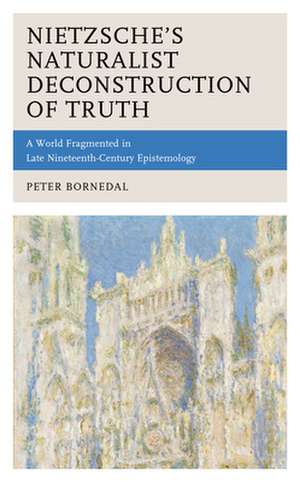NIETZSCHES NATURALIST DECONSTRCB
Autor Peter Bornedalen Limba Engleză Hardback – 2 ian 2020
Preț: 749.85 lei
Preț vechi: 1027.19 lei
-27% Nou
Puncte Express: 1125
Preț estimativ în valută:
143.53€ • 155.96$ • 120.64£
143.53€ • 155.96$ • 120.64£
Carte tipărită la comandă
Livrare economică 21 aprilie-05 mai
Preluare comenzi: 021 569.72.76
Specificații
ISBN-13: 9781498579308
ISBN-10: 1498579302
Pagini: 340
Dimensiuni: 152 x 229 x 22 mm
Greutate: 0.61 kg
Editura: Rowman & Littlefield
ISBN-10: 1498579302
Pagini: 340
Dimensiuni: 152 x 229 x 22 mm
Greutate: 0.61 kg
Editura: Rowman & Littlefield
Notă biografică
By Peter Bornedal
Descriere
This book presents a new interpretation of Nietzsche's discussions of truth and knowledge, covering the period from his early essay "On Truth and Lies" to his late notebooks. It views these discussions in the context of the neo-Kantian, Naturalist, Positivist, and Pragmatic schools influential in Nietzsche's late nineteenth-century Europe.
